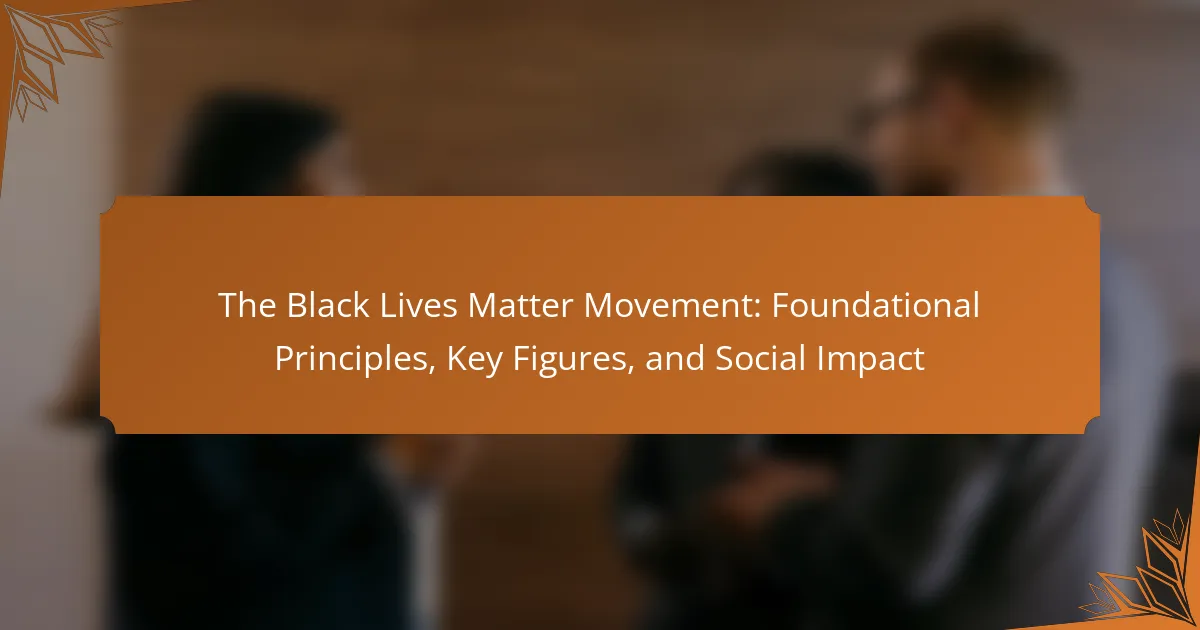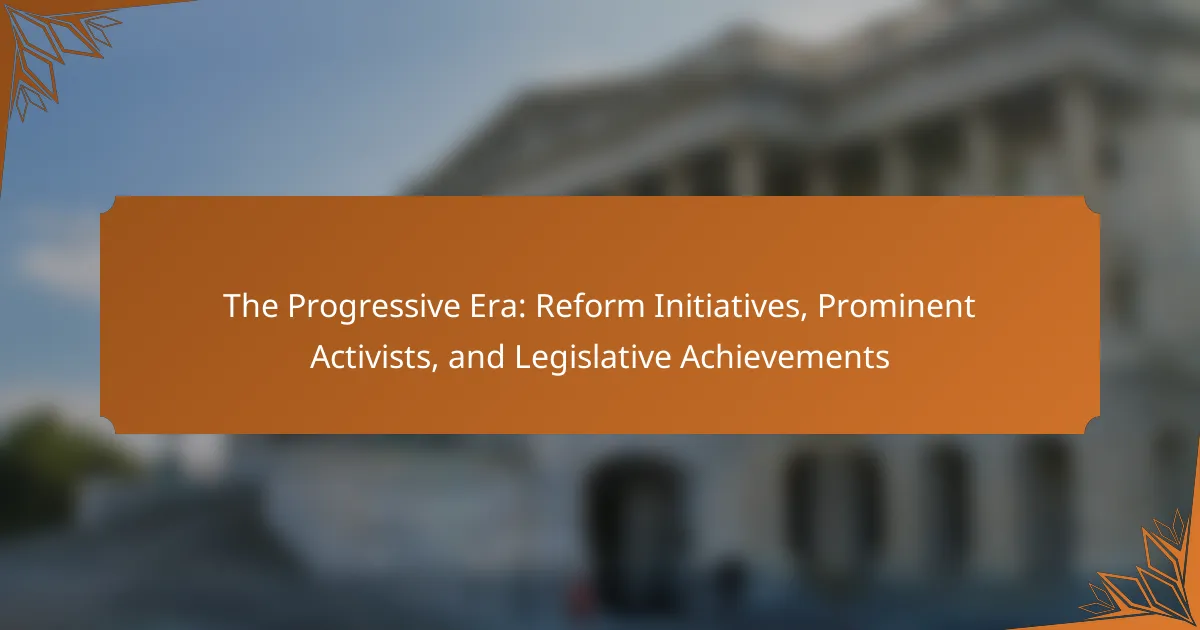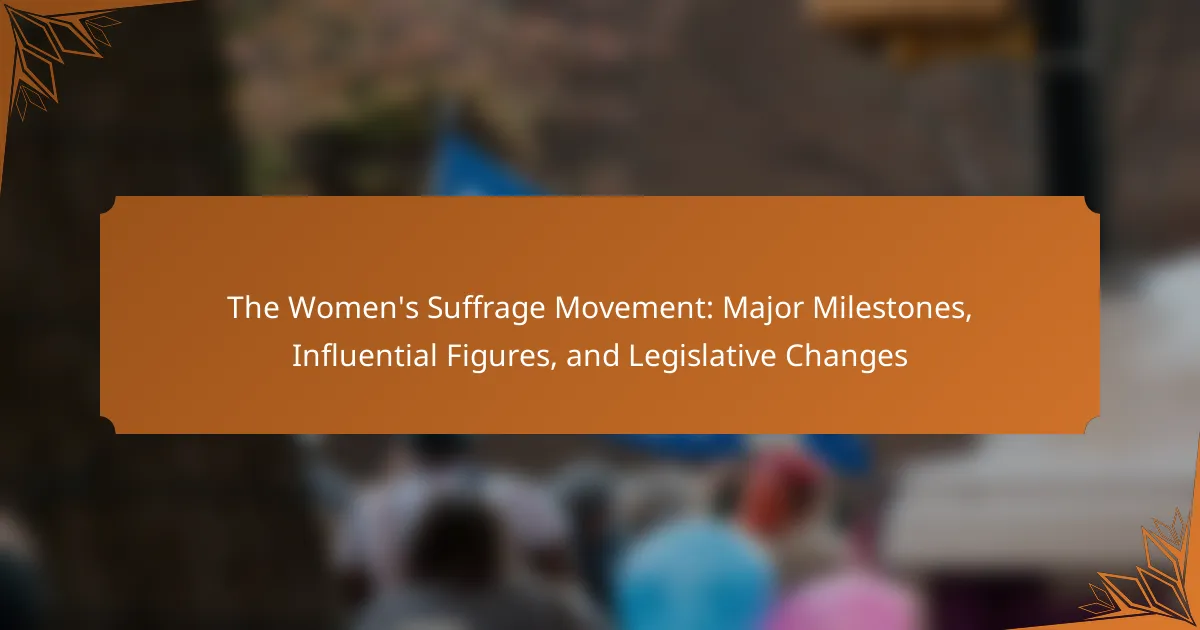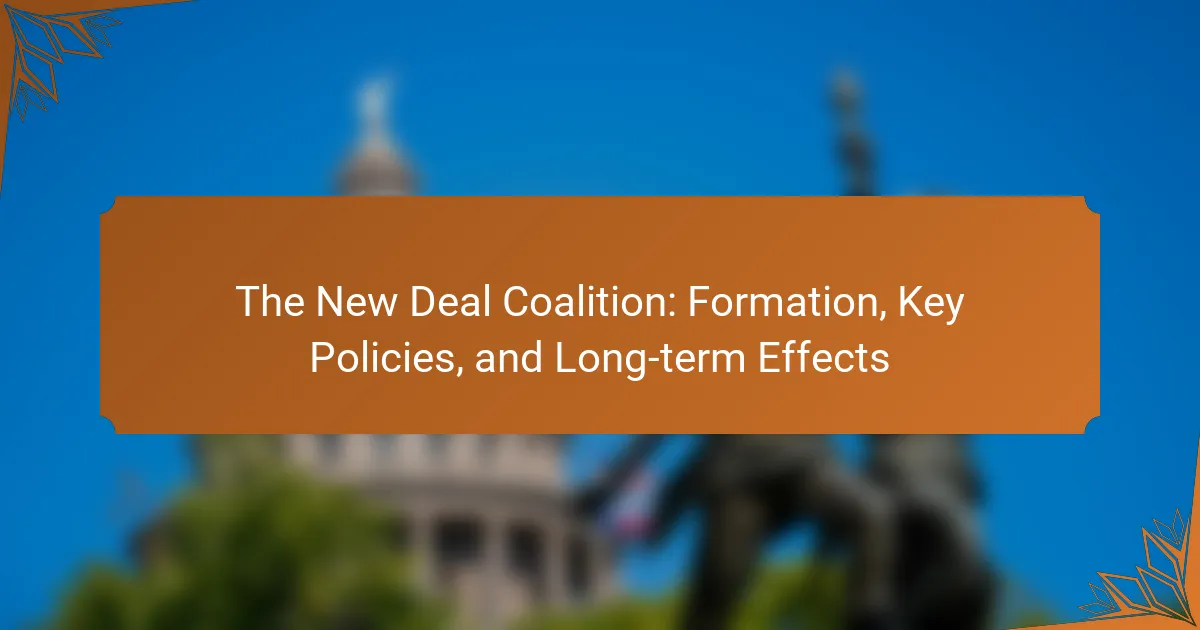The Black Lives Matter Movement is a decentralized social and political initiative advocating for the rights and dignity of Black individuals, emerging in response to systemic racism and police brutality. Founded in 2013 by Alicia Garza, Patrisse Cullors, and Opal Tometi, the movement gained momentum following high-profile incidents of violence against Black people. It has mobilized millions globally, influencing discussions on racial inequality, police reform, and social justice. The movement’s impact is evident in policy changes, increased media attention to racial issues, and the rise of educational programs focused on racial equity.
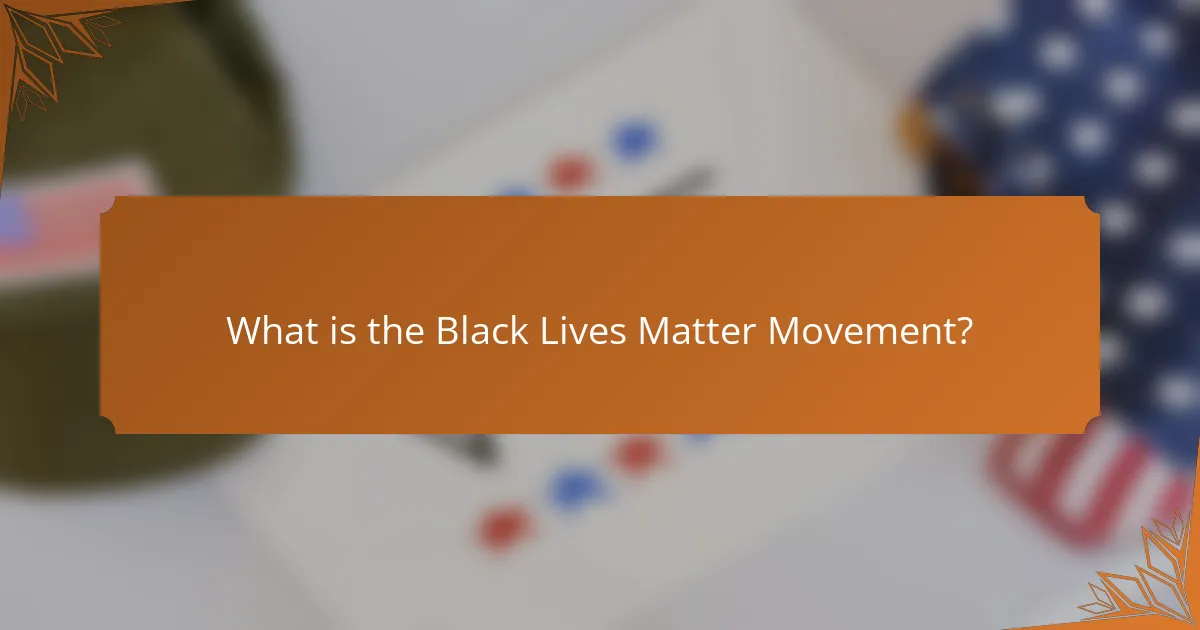
What is the Black Lives Matter Movement?
The Black Lives Matter Movement is a decentralized social and political movement advocating for the rights and dignity of Black individuals. It emerged in response to systemic racism and violence against Black people, particularly police brutality. The movement began in 2013 after the acquittal of George Zimmerman in the shooting death of Trayvon Martin. It gained significant traction following high-profile cases of police violence, such as the deaths of Michael Brown and Eric Garner. Activists use the hashtag #BlackLivesMatter to organize protests and raise awareness. The movement emphasizes the importance of addressing issues like racial inequality and social justice. It has influenced discussions on police reform and civil rights across the globe.
How did the Black Lives Matter Movement begin?
The Black Lives Matter Movement began in 2013. It was initiated by Alicia Garza, Patrisse Cullors, and Opal Tometi. The movement emerged in response to the acquittal of George Zimmerman. Zimmerman was charged in the shooting death of Trayvon Martin. The hashtag #BlackLivesMatter was first used on social media. It quickly gained traction and became a rallying cry for racial justice. The movement aims to address systemic racism and police brutality. It has since organized protests and campaigns across the United States and globally.
What events catalyzed the formation of the Black Lives Matter Movement?
The Black Lives Matter Movement was catalyzed by the acquittal of George Zimmerman in the 2012 shooting death of Trayvon Martin. This event sparked widespread outrage and protests across the United States. Activists Alicia Garza, Patrisse Cullors, and Opal Tometi initiated the hashtag #BlackLivesMatter in response. The movement gained momentum following the deaths of Michael Brown in Ferguson, Missouri, and Eric Garner in New York City. These incidents highlighted systemic racism and police violence against Black individuals. The collective response led to nationwide demonstrations and a call for justice. The movement has since evolved into a broader social justice initiative.
Who were the founders of the Black Lives Matter Movement?
The founders of the Black Lives Matter Movement are Alicia Garza, Patrisse Cullors, and Opal Tometi. They initiated the movement in 2013. The founding was a response to the acquittal of George Zimmerman in the shooting death of Trayvon Martin. Garza, Cullors, and Tometi aimed to address systemic racism and violence against Black individuals. Their hashtag, #BlackLivesMatter, quickly gained traction on social media. This grassroots movement has since evolved into a global network advocating for racial justice. The founders continue to play significant roles in social activism and community organizing. Their work has inspired numerous protests and discussions about race and equality.
What are the foundational principles of the Black Lives Matter Movement?
The foundational principles of the Black Lives Matter Movement focus on advocating for racial justice and equality. The movement emphasizes the importance of addressing systemic racism. It seeks to dismantle structures that perpetuate discrimination against Black individuals. The principles also highlight the need for accountability in law enforcement practices. Additionally, the movement promotes the affirmation of Black humanity and dignity. It encourages community empowerment and collective action. These principles aim to create a society where all Black lives are valued and protected. The movement’s core values are rooted in social justice and human rights.
What core values does the Black Lives Matter Movement promote?
The Black Lives Matter Movement promotes values of social justice, equality, and anti-racism. These core values emphasize the importance of addressing systemic racism and advocating for the rights of Black individuals. The movement seeks to challenge and dismantle oppressive systems that perpetuate inequality. It also prioritizes the empowerment of marginalized communities. The emphasis on intersectionality highlights the diverse experiences within the Black community. Additionally, the movement advocates for policy changes to ensure accountability in law enforcement. These values are rooted in the belief that all lives cannot matter until Black lives matter.
How do these principles address systemic racism?
The principles of the Black Lives Matter movement address systemic racism by advocating for the dismantling of oppressive structures. These principles emphasize the need for policy reform in policing and criminal justice. They call for accountability for law enforcement and an end to racial profiling. Additionally, the movement highlights the importance of intersectionality in understanding how various forms of oppression intersect. Research shows that systemic racism manifests in disparities in wealth, education, and health. The movement’s focus on these issues aims to create a more equitable society. By promoting community empowerment and engagement, these principles seek to challenge and change systemic inequalities.
Why is the Black Lives Matter Movement significant today?
The Black Lives Matter Movement is significant today due to its role in advocating for racial justice and equality. It addresses systemic racism and police violence against Black individuals. The movement gained global attention after high-profile cases such as George Floyd’s death in 2020. Protests sparked worldwide, mobilizing millions to demand change. The movement has influenced policy discussions on police reform and social justice initiatives. It has also raised awareness about racial disparities in various sectors, including healthcare and education. Through social media, the movement amplifies voices and stories of marginalized communities. The ongoing relevance of the Black Lives Matter Movement highlights the need for continued activism and societal change.
What social issues does the Black Lives Matter Movement seek to address?
The Black Lives Matter Movement seeks to address systemic racism and police brutality against Black individuals. It highlights issues such as racial profiling, excessive use of force by law enforcement, and the disproportionate incarceration rates of Black people. The movement also advocates for social justice, equality in education, and economic opportunities for marginalized communities. It addresses the need for accountability in policing and reforms in the criminal justice system. The movement aims to raise awareness of the historical and ongoing oppression faced by Black individuals. It emphasizes the importance of community empowerment and engagement in the fight for civil rights.
How does the movement influence public policy and societal change?
The Black Lives Matter movement influences public policy and societal change by advocating for racial justice and equity. It mobilizes grassroots activism to raise awareness about systemic racism. The movement organizes protests that attract significant media attention, prompting discussions on police brutality and racial inequality. Legislative changes, such as the introduction of police reform bills, have been influenced by its activism. For instance, the George Floyd Justice in Policing Act was introduced in response to nationwide protests. The movement also fosters community engagement and dialogue on race relations. This engagement can lead to shifts in public opinion, which may pressure policymakers to enact reforms. Data from surveys indicate increased public support for racial justice initiatives following BLM protests.
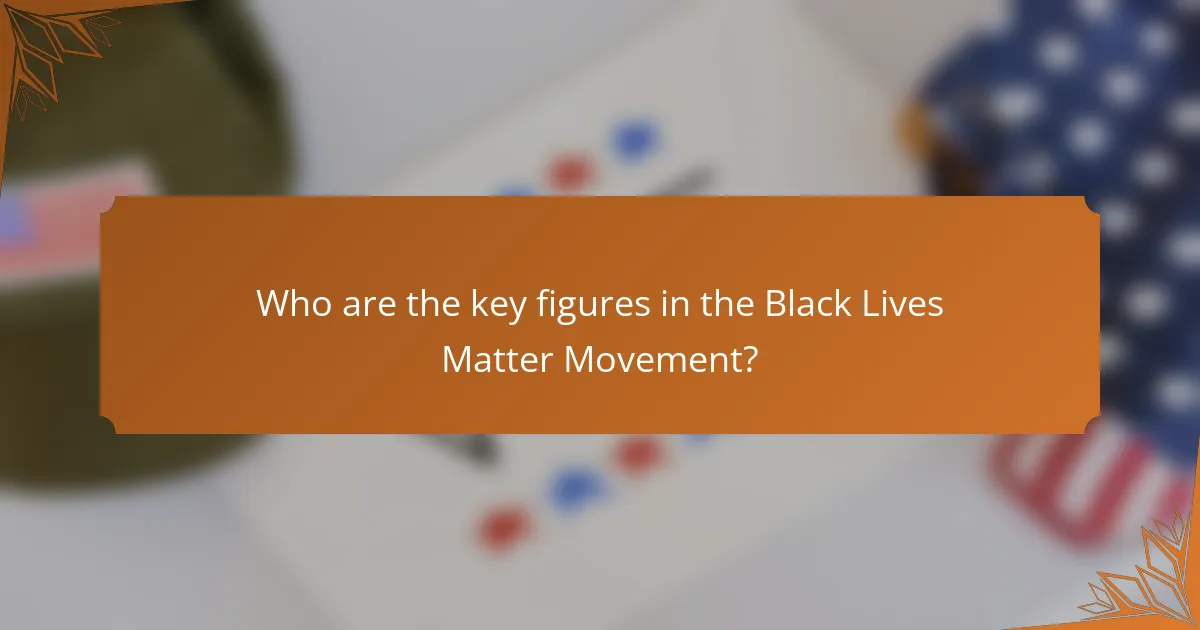
Who are the key figures in the Black Lives Matter Movement?
The key figures in the Black Lives Matter Movement include Alicia Garza, Patrisse Cullors, and Opal Tometi. Alicia Garza is one of the co-founders. She initiated the hashtag #BlackLivesMatter in 2013. Patrisse Cullors is also a co-founder. She has been instrumental in organizing protests and raising awareness. Opal Tometi, the third co-founder, has focused on advocacy and community organizing. These three women played pivotal roles in shaping the movement. Their efforts have brought national attention to issues of racial injustice. Together, they established a framework for activism that continues to influence social movements today.
What roles do the founders play in the movement?
The founders of the Black Lives Matter movement play crucial roles in shaping its direction and philosophy. They are responsible for establishing the movement’s core principles, emphasizing racial justice and equality. The founders actively engage in organizing protests and community outreach efforts. They also create educational resources to raise awareness about systemic racism. Their leadership helps to mobilize diverse groups in support of the movement. Additionally, the founders advocate for policy changes at local and national levels. Their visibility in media amplifies the movement’s message. Overall, the founders are instrumental in maintaining the movement’s momentum and focus on social change.
How have their backgrounds shaped the movement’s direction?
The backgrounds of key figures in the Black Lives Matter movement have significantly shaped its direction. Many founders come from diverse social justice backgrounds. For instance, Alicia Garza, Opal Tometi, and Patrisse Cullors have experience in activism and community organizing. Their experiences with systemic racism and injustice inform their strategies. The movement emphasizes intersectionality, reflecting their varied identities. This approach broadens the movement’s appeal and inclusivity. Their backgrounds influence the movement’s focus on police brutality, racial inequality, and social justice. Consequently, these elements guide the movement’s goals and public messaging.
What contributions have they made to social justice initiatives?
The Black Lives Matter movement has made significant contributions to social justice initiatives. It has raised awareness about systemic racism and police brutality. The movement has organized protests and rallies, mobilizing thousands to advocate for change. BLM has influenced policy discussions on criminal justice reform. It has also supported legislation aimed at reducing racial disparities. The movement has created educational resources to inform the public about racial issues. Additionally, BLM has fostered community engagement and solidarity among marginalized groups. Through these efforts, the movement has reshaped the national conversation on race and justice.
Who are other influential figures within the movement?
Other influential figures within the Black Lives Matter movement include Alicia Garza, Patrisse Cullors, and Opal Tometi. Alicia Garza co-founded the movement and is known for her activism and writings on racial justice. Patrisse Cullors, another co-founder, has played a significant role in mobilizing protests and advocating for policy changes. Opal Tometi is recognized for her work in community organizing and international advocacy. Additionally, figures like DeRay Mckesson and Brittany Packnett have contributed to the movement through their activism and public speaking. These individuals have helped shape the mission and visibility of the movement through their leadership and engagement.
What impact have activists and supporters had on the movement’s growth?
Activists and supporters have significantly propelled the growth of the Black Lives Matter movement. Their efforts have mobilized communities across the globe. Grassroots organizing has led to increased awareness of racial injustice. Social media campaigns have amplified the movement’s message. High-profile protests have garnered national and international attention. Support from celebrities and public figures has expanded the movement’s reach. Research indicates that sustained activism correlates with legislative changes, such as police reform initiatives. The collective action of supporters has created a lasting impact on societal conversations about race.
How do these individuals amplify the movement’s message?
These individuals amplify the Black Lives Matter movement’s message through strategic communication and activism. They utilize social media platforms to reach a global audience. This approach allows for rapid dissemination of information and mobilization of supporters. Key figures often share personal stories that resonate emotionally with the public. They engage in public speaking to raise awareness about systemic racism. Additionally, they organize protests that attract significant media coverage. This visibility enhances public discourse around racial justice issues. Studies show that grassroots activism can effectively shift public opinion and policy.
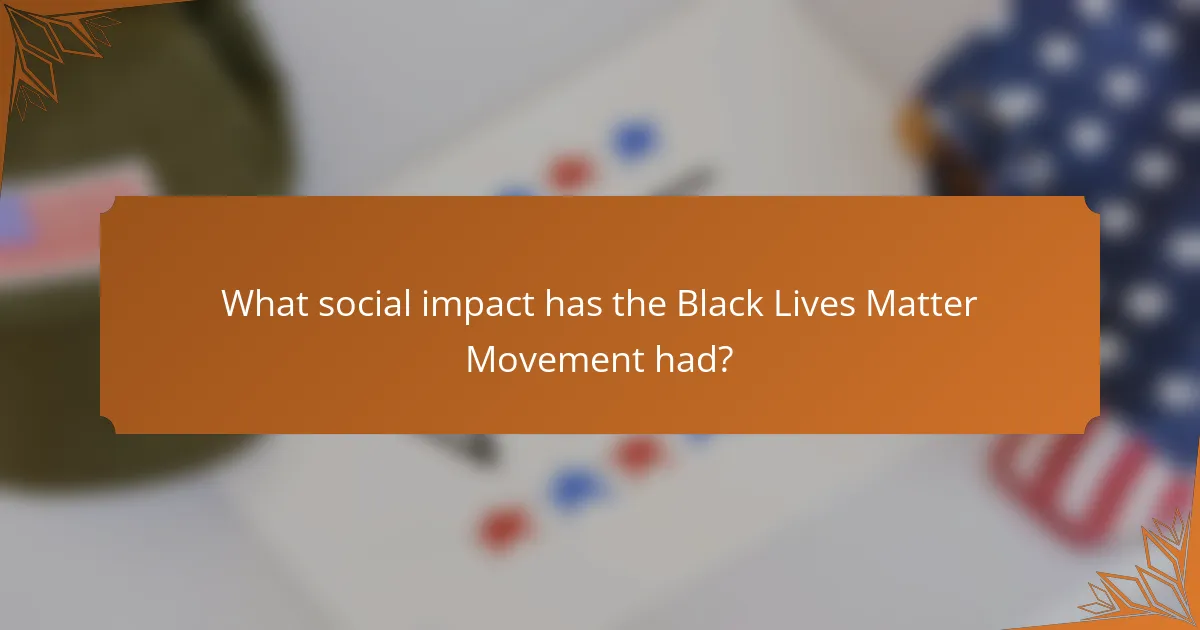
What social impact has the Black Lives Matter Movement had?
The Black Lives Matter Movement has significantly influenced social awareness and activism regarding racial injustice. It has mobilized millions globally to advocate for systemic change. The movement has prompted discussions on police brutality and systemic racism in various communities. It has led to policy changes in law enforcement practices in several cities. The movement has also inspired other social justice causes to gain traction. Increased media coverage of racial issues has resulted from its efforts. Moreover, BLM has fostered solidarity among diverse groups fighting for equality. The movement’s impact is evident in the rise of educational programs addressing racial equity in schools and institutions.
How has the Black Lives Matter Movement changed public perception of racial issues?
The Black Lives Matter Movement has significantly changed public perception of racial issues. It has raised awareness about systemic racism and police brutality. The movement has mobilized millions globally, creating a widespread dialogue on racial inequality. High-profile incidents, such as the death of George Floyd, sparked protests and discussions. Polls indicate increased recognition of racial discrimination among the general public. Research shows that support for racial justice initiatives has grown since the movement’s inception. Additionally, social media has amplified voices advocating for change. The movement has influenced policy discussions and legislative proposals addressing racial equity. These factors collectively illustrate the profound impact of Black Lives Matter on societal views of race.
What evidence shows a shift in societal attitudes towards racism?
Evidence shows a shift in societal attitudes towards racism through increased public support for racial equality. Polls indicate that a majority of Americans now acknowledge systemic racism. For instance, a 2020 Pew Research Center survey found that 76% of respondents viewed racism as a major issue. Additionally, the Black Lives Matter movement has significantly raised awareness. Protests following George Floyd’s death saw participation from diverse demographics. This indicates broader societal engagement against racism. Furthermore, many corporations have publicly committed to diversity and inclusion initiatives. Legislative changes, such as police reform proposals, also reflect evolving attitudes.
How has the movement affected conversations around police reform?
The Black Lives Matter movement has significantly influenced conversations around police reform. It has brought issues of systemic racism and police brutality to the forefront of public discourse. The movement has mobilized protests and advocacy efforts, demanding accountability and transparency in law enforcement. Legislative proposals for police reform have gained traction in various jurisdictions. For example, the George Floyd Justice in Policing Act was introduced in Congress in response to the movement’s calls for change. Public awareness and support for reforms such as defunding the police have increased. Surveys indicate that a majority of Americans now support reforms aimed at reducing police violence. Overall, the movement has reshaped the narrative around policing and reform in the United States.
What are the movement’s achievements and challenges?
The Black Lives Matter Movement has achieved significant visibility and awareness around racial injustice. It has successfully mobilized millions globally, leading to protests and policy discussions. The movement has influenced conversations about police reform and systemic racism. Legislative changes, such as the George Floyd Justice in Policing Act, have emerged as a direct response to its advocacy.
However, the movement faces challenges including internal divisions and opposition from various groups. Critics argue that its tactics can be polarizing. Additionally, sustaining momentum in activism and policy change remains a struggle. The movement also deals with issues of representation and inclusivity within its ranks.
What milestones has the Black Lives Matter Movement reached since its inception?
The Black Lives Matter Movement has achieved significant milestones since its inception in 2013. It gained international recognition following the acquittal of George Zimmerman in the shooting of Trayvon Martin. The movement has organized numerous protests, including the 2014 demonstrations after the deaths of Michael Brown and Eric Garner. In 2020, the movement saw a global resurgence following the murder of George Floyd. This led to widespread protests across the United States and around the world.
The movement has influenced policy changes, including police reforms in several cities. It has also sparked national conversations about systemic racism and social justice. Black Lives Matter has formed strategic partnerships with various organizations to amplify its message. The movement’s impact is reflected in increased voter turnout among Black communities in recent elections.
What obstacles does the movement continue to face in its advocacy?
The Black Lives Matter Movement continues to face significant obstacles in its advocacy. One major challenge is systemic racism entrenched in institutions. This includes law enforcement practices that disproportionately target Black individuals. Another obstacle is political resistance from lawmakers who oppose the movement’s goals. This resistance often manifests in legislation that undermines police reform efforts. Additionally, misinformation and negative media portrayals hinder public support for the movement. Economic disparities also limit the movement’s reach and impact. Funding and resources for grassroots organizations are often insufficient. These obstacles collectively impede the movement’s ability to effect meaningful change.
How can individuals support the Black Lives Matter Movement?
Individuals can support the Black Lives Matter Movement by participating in protests and demonstrations. Engaging in peaceful protests raises awareness about racial injustice. Donations to organizations that promote racial equality also provide crucial financial support. Volunteering time with local advocacy groups helps strengthen community efforts. Educating oneself and others about systemic racism fosters informed discussions. Sharing resources and information on social media amplifies the movement’s message. Supporting Black-owned businesses contributes to economic empowerment within the community. Voting for policies and candidates that prioritize racial justice influences systemic change.
What actions can people take to contribute to racial justice efforts?
People can contribute to racial justice efforts by educating themselves about systemic racism. Understanding history and current issues is crucial. Engaging in conversations about race can raise awareness. Supporting racial justice organizations through donations or volunteering is effective. Participating in peaceful protests amplifies voices advocating for change. Advocating for policy reforms at local and national levels influences legislation. Voting for candidates who prioritize racial equity is essential. Lastly, holding individuals and institutions accountable promotes sustained progress.
How can community engagement enhance the movement’s impact?
Community engagement can enhance the movement’s impact by fostering a sense of ownership among participants. Engaged communities are more likely to mobilize resources and support for initiatives. This involvement leads to increased visibility and awareness of the movement’s goals. Studies show that grassroots efforts amplify messages effectively. For example, the Black Lives Matter movement gained momentum through local events and community discussions. These activities create networks that facilitate collaboration and solidarity. Engaged individuals often act as advocates, spreading awareness beyond their immediate circles. Ultimately, community engagement strengthens the movement’s reach and effectiveness in promoting social change.
The Black Lives Matter Movement is a decentralized social and political initiative advocating for the rights and dignity of Black individuals, emerging in 2013 in response to systemic racism and police brutality. Key figures, including co-founders Alicia Garza, Patrisse Cullors, and Opal Tometi, have played pivotal roles in shaping the movement’s principles and mobilizing activism. The article explores the movement’s foundational principles, significant milestones, and social impact, detailing how it addresses systemic racism and influences public policy. It also highlights the challenges faced by the movement and the various ways individuals can support racial justice efforts.
